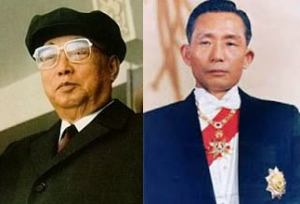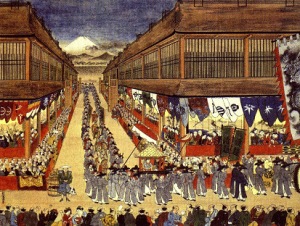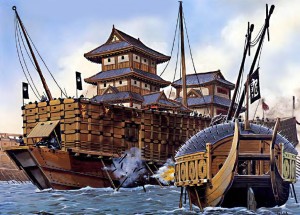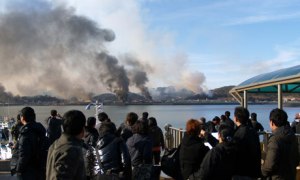“History never looks like history when you’re living through it.” – Gerald W. Johnson
It’s a famous quote from a great historian and probably the best response to that modern belief that history, or at least the interesting part of it, is over. It’s difficult to see the things around you as pages on some GCSE textbook, sure, but that doesn’t mean that nothing worth studying is happening right now, and it definitely doesn’t mean that all the ups and downs of the past are becoming irrelevant. In this post, I’m going to try and prove it by jumping into contemporary history, to talk about a place where legacy of the past is still perfectly clear and a place where history is obviously still in the making. It’s extraordinary, it’s interesting and it’s much more relevant than you might give it credit to be: ladies and gents, the history of Korea.
Like a lot of Asian nations, Korea’s history stretches so far back that its history gets intertwined with its myth. There’s a little archaeological evidence for some of it – Koreans seem to have lived on the peninsula for 10,000 years and went through a stone age, bronze age, iron age process at a similar rate to Japan – but I’m still waiting on evidence that the kingdom was founded by a mystic bear who was turned into a woman by the god of the sky. From there, Korea (well, Joseon at the time, but you know) began splitting up into smaller kingdoms, then larger ones, then smaller ones again – all filled with the kind of imaginative naming that you would expect from history, like the “Three Kingdoms Era” and the “North/South States Era”. Korea was unified for what many must have believed to be the last time in 918AD under the banner of the northern kingdom, Koryo. You will never guess how that translates into English.
Korea did quite well out of trade with China and Japan, those being the two states in the area capable of trading – and ended up sharing aspects of their language and culture with both. The kingdom developed a reputation as a polite and reserved country (polite, reserved kingdom, north-south divide…I’m resisting the urge to compare Korea to England). They also got really good at defending themselves – as a peninsula with mountains to the North and a badass navy – I mean, fire-breathing impenetrable tank boat badass – so managed to remain independent for the best part of 1,000 years. But that could never last, because come the 20th century Korea came into the sights of the world’s newest Asian superpower. If you’ve read this, it might seem rather familiar.
Japan was in its western-style industrial age when it started its diplomacy with Korea, and as such wanted to gain control of Korea in a western sort of way – flood it with treaties, concessions and gunboat diplomacy. Korea, probably being much more used to full-on war, was annexed completely in 1910. The following decades under Japanese rule would bring statism and fascism to Korea, all under the premise of “co-prosperity” rule, and finally dragged it into something that would change the course of its history forever. Specifically, the Second World War. More specifically, the losing side. By 1945, the Axis had unilaterally surrendered. What was left of them was split between the victorious powers – Hungary and Romania were occupied by the USSR, Japan by the US, and Germany split four ways, then unhappily consolidated into two. Korea was left until the last minute and split between the USA and USSR – the USSR, naturally, taking the north nearer to its border and the USA taking the south nearer to occupied Japan. Then, in 1947, two years into occupation, the frosty relationship between the two occupying powers got colder.

…but which is the Capitalist Dictator (Park Chung-hee) and which is the Communist Dictator (Kim Il-sung)?
Where Germany was split between East and West, Korea was split between North and South. The South installed Syngman Rhee, a liberal Christian reformer with strong ties to America. The North installed Kim Il-Sung, a communist freedom fighter with a taste for Stalin’s personality cults in Russia. Kim Il-Sung is still technically in charge of North Korea, despite the minor complication of his death in 1994. As “Eternal Leader”, he always will be. The Korean War was an attempt by the North to bring Korea back together again, and quickly became the first true armed conflict of the Cold War as the USA rushed to the South’s aid, but the attempt failed and the two states were left refusing to accept the other as legitimate – they still don’t. Then, in the 1960s, democracy in South Korea fell to the military government of Park Chung-Hee, laissez-faire dictator, and the South became simultaneously more and less like the impoverished North as its freedoms diminished and its economy boomed. In the late 1980s, the South won back its freedom to vote and the North lost out on its USSR funding. Then, in 2006, North Korea gained its first nuclear weapons.
Korea might be just as famous at the moment for its most well-known characters – one ridiculous camp man with an internet following and another ridiculous camp man with a country – than its open hostility and instability, but the fact is that Korean history is far from resolved and developing even today. Not only are they a direct continuation of that great historical conflict, the Cold War, that’s happening right now, they’re hugely related to and influenced by their past. They’re still divided between the USA and the USSR’s politics – and the latter doesn’t even exist any more. They’re still named after ancient unified kingdoms – the North even calls itself Joseon. North Korea’s leader is the grandson of the dictatorial Kim Il-Sung. And South Korea’s is the daughter of the dictatorial Park Chung-Hee. Korea’s story, like every country’s, is still immersed hugely in its past and almost certainly has troubles to come. Either the South will suffer under Communism, or the impoverished North under capitalism, or one of the world’s most homogenous cultures will stay split forever. Gerald W. Johnson lived through two world wars and still couldn’t see the history around him. Aspire to do better.
For more on Korea’s current affairs, I really recommend this.


